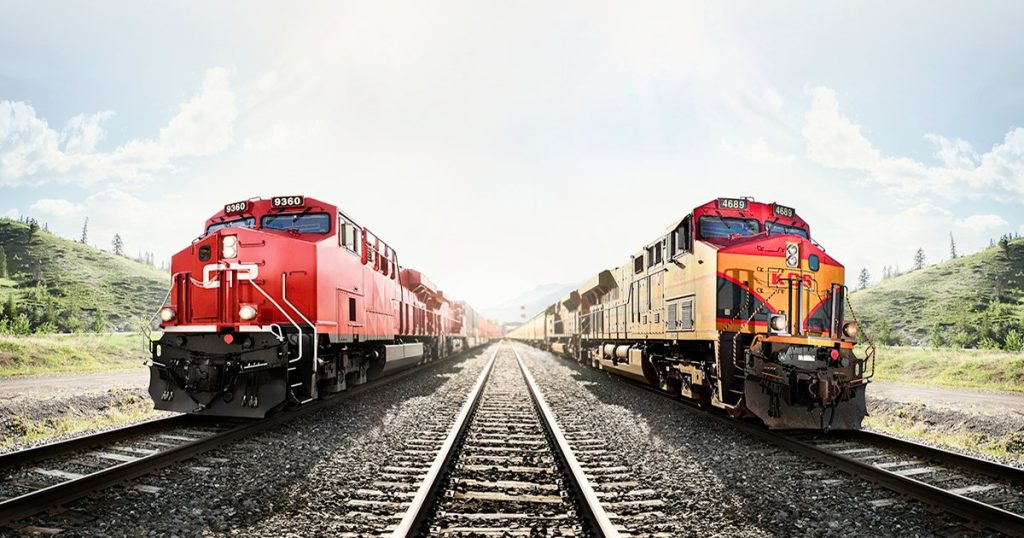 Canadian Pacific (CP) announced that the Kansas City Southern (KCS) merger will officially enter force on April 14, 2023 creating Canadian Pacific Kansas City (CPKC), the first and only single-line railway connecting the U.S., Mexico and Canada.
Canadian Pacific (CP) announced that the Kansas City Southern (KCS) merger will officially enter force on April 14, 2023 creating Canadian Pacific Kansas City (CPKC), the first and only single-line railway connecting the U.S., Mexico and Canada.
The merger will “create a truly unique single-line network connecting three nations and instantly injecting new competition into the North American rail industry when our supply chains have never needed it more,” Keith Creel, CP President and CEO, said.
CPKC plans capital investments in new infrastructure of more than USD 275 million over the next three years to improve rail safety and capacity of the core north-south CPKC main line between Louisiana and the Upper Midwest.
CP completed its USD 31 billion acquisition of KCS on December 14, 2021 and immediately upon the closing of that acquisition, shares of KCS were placed into a voting trust which has ensured that KCS operates independently of CP during the regulatory review process.
On March 17, CP also announced the executive leadership team that will lead CPKC. Keith Creel become President and CEO of the established company, Nadeem Velani, was appointed as the Executive Vice-President and Chief Financial Officer, John Brooks, the Executive Vice-President and Chief Marketing Officer and Mark Redd, the Executive Vice-President and Chief Operating Officer.
Pat Ottensmeyer, KCS President and CEO, has agreed to continue to be an advisor to Keith Creel through the remainder of 2023 to ensure continuity on key initiatives predominantly involving the combined company and Mexico.
Headquartered in Calgary, Alberta, Canada, CPKC will be the first railway connecting North America. While remaining the smallest of six U.S. Class 1 railways by revenue, the combined company will have a much larger and more competitive network, operating approximately 20,000 miles of rail (almost 32,200), employing close to 20,000 people. Full integration of CP and KCS is expected to happen over the next three years, unlocking the benefits of the combination.
Anticipated environmental benefits of CPKC include the avoidance of more than 1.6 million tonnes of greenhouse gas emissions due to the anticipated improved operational efficiency of CPKC versus current operations and another 300,000 tonnes of GHG emissions with the diversion of 64,000 trucks to rail for a total reduction of 1.9 million tonnes of GHG emissions over the next five years. By diverting 64,000 long-haul truck shipments to rail annually with new CPKC intermodal services, reducing total truck vehicle miles traveled by almost 2 billion miles over the next two decades, saving USD 750 million in highway maintenance costs.
The new created company will also support the expansion of Amtrak and other passenger services on the CPKC network. CP has one of the best Amtrak on-time performance records in the industry and has won Amtrak’s support for this merger. CPKC has committed to supporting Amtrak’s expansion plans, and to funding infrastructure improvements. As a result of the merger, CPKC will allow Amtrak to add new passenger service over the KCS-owned lines between New Orleans and Baton Rouge and the CP-owned lines through the Detroit River Tunnel between Detroit, and Windsor, Ontario. The Board has recognised the agreements between CP and Amtrak and imposed them as a condition for merger approval.
On Mach 15, the U.S. Surface Transportation Board (STB) granted the final decision for CP – Kansas City Southern merger with conditions. The decision includes a seven-year oversight period and contains many conditions designed to mitigate environmental impacts, preserve competition, protect railway workers, and promote efficient passenger rail. The Board also anticipates the merger will result in improvements in safety and the reduction of carbon emissions. The institution expects the merger and imposed conditions to result in an overall public benefit.
On competition, STB says that the combination of the two companies will continue to be the smallest Class I rail company, with a network that is a few thousand route miles shorter than the next smallest Class I and half the size of the Western railways. The transaction is end-to-end, meaning there are little to no track redundancies or overlapping routes between the railways, as they connect only in Kansas City.
To mitigate anticompetitive risks, STB has imposed numerous conditions which will preserve existing rail service options at affected “gateways” – interchange points between CPKC and other railways – on commercially reasonable terms, which should ensure competitive options are not reduced for shippers served by CP or KCS. This condition applies equally to existing and new service. If CPKC increases its rates to an affected gateway by more than inflation, STB is providing shippers with an unprecedented right to require CPKC to provide the shipper with written justification for the increase so that shippers can evaluate whether the increased rates are challengeable. The shipper may bring challenges to the commercial reasonableness of CPKC rates or service at affected gateways directly to the Board in a streamlined process, or in arbitration.
Share on:



